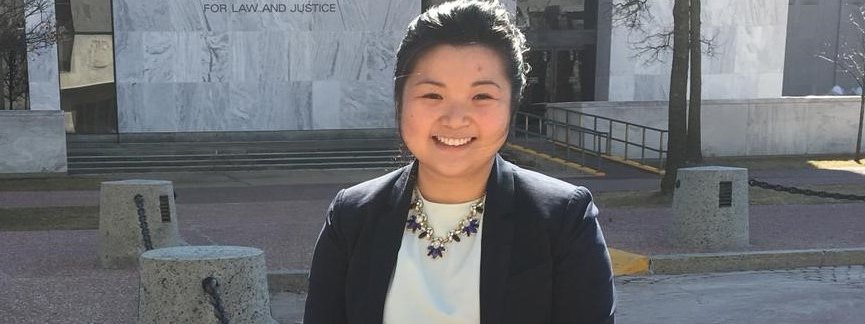Class of 2013
HBSc. Physics and Philosophy Double Major, Mathematics Minor

Link to bio: https://www.osler.com/en/team/danielle-chu
I am currently a lawyer with Osler, Hoskin & Harcourt LLP in Toronto, Ontario. I practice Competition/Anti-Trust, Foreign Investment and International Trade law. I moved to Toronto from Calgary, Alberta in October 2019, where I was previously practicing with Osler’s Litigation – Regulatory, Environmental, Indigenous and Land Law Specialty Group.
In my spare time, I enjoy camping, whitewater kayaking, outdoor rock climbing, hiking, cooking, watching reruns of The Simpsons, and spending time with my loved ones.
Interactions asked Danielle some questions about her career path.
Why did you choose Physics for your undergraduate degree?
I had originally planned to fall squarely in the “Arts” side of Arts & Science with a Philosophy specialist degree. While I had always loved engaging with concepts in my high school physics and chemistry courses, especially quantum physics, I was told that I did not possess the natural talent in mathematics to seriously pursue the sciences.
One day as I was walking down St. George debating between a History or English minor, I passed by the McLennan Physics Building. I’m not entirely sure what happened but I stopped in my tracks, looked at the building and thought to myself, “this is where I belong”. I went to the registrar that day to change my major to the double major I have today in Physics and Philosophy and minor in Mathematics.
What did you love most about your physics degree?
I owe much to my physics training, but in particular two things: 1) the physics degree taught me how to think; and 2) the physics degree taught me how to be resilient.
In terms of learning how to think, your physics and math courses require you to problem solve at a very high caliber and grapple with very difficult concepts. Being challenged with such difficult problems requires you to learn how to spot patterns, learn how to learn, learn how to work smart (rather than only working hard), and learn how to problem solve in a team with your peers. These skills and ways of thinking are material to success in a physics degree, and are skills that have followed me into all my endeavours beyond.
Related to this was learning how to be resilient. I frequently tell people that the physics degree at U of T was one of the hardest things I had ever done. As I have experienced, so much of success in any pursuit is not about talent, but rather about how quickly you dust yourself off, take a fresh look at the problem and keep going. It is not an exaggeration for me to say that often when I feel like I am faced with a challenge that is too much, I think to myself “If I could succeed in my physics degree, I can do this!”. This mantra has gotten me through many tough situations!
How did your training in physics help with your career path in law?
How the physics degree has helped with my career path boils down to three major themes: 1) in substance; 2) in how to think; 3) in establishing credibility.
In terms of substance, my prior legal practice in Regulatory and Environmental work mainly focused on energy projects including mines, oil and gas, and renewable energy projects. Many of these files involved working closely with scientists and engineers, including reading scientific reports and technical material. Since many of our clients had a science background, they were eager to have a lawyer who spoke their language and who could easily grasp the concepts they had to deal with. Similarly in my current Competition practice, our files involve working with economists and often require substantive work with economic theory and formulas. It is an advantage to be a lawyer that isn’t afraid of numbers!
In terms of the physics degree having trained my ability to think, much of this relates to the question above. The problem solving, critical thinking and teamwork skills you learn in physics are transferable in every area. In particular, these skills are material to being a good lawyer and I have my physics degree to thank for honing them.
Lastly, one thing I was surprised to find was that having a physics degree comes with a level of cachet and serves to bolster credibility. I suspect this stems from the fact that a lot of people had their own tough experiences with physics and know that it is an inherently difficult subject. In my experience, having a physics degree is a nice little shortcut to establishing your capabilities. People know you’re smart and no further proof is required. It’s definitely a pleasantly surprising bonus!
All that being said, while the physics degree certainly was challenging, it was also deeply rewarding and continues to pay dividends. To everyone who is currently pursuing their physics degree – I know it’s difficult but the difficulty makes the success all that much sweeter; and the lessons you learn will carry you far into whatever you choose to do next. You can do it!

